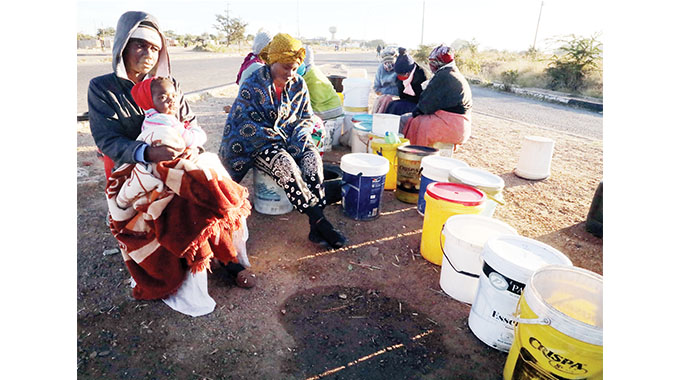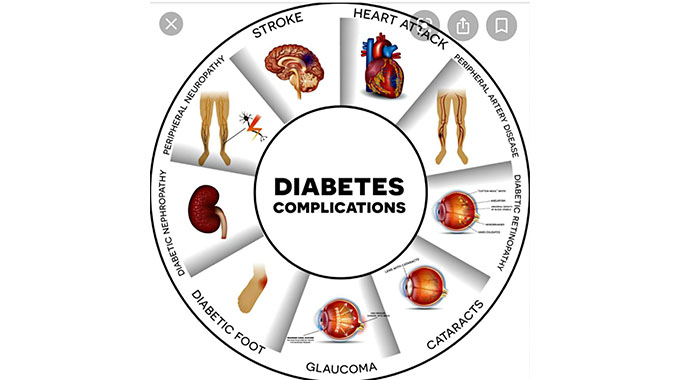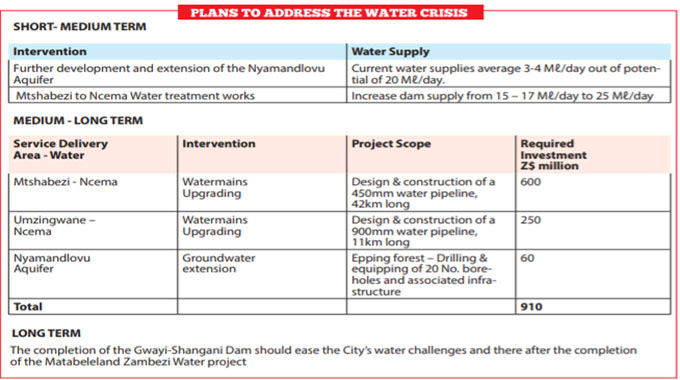Water crisis: women bear the brunt

Thandeka Moyo-Ndlovu, Chronicle Reporter
BULAWAYO’s perennial water challenges are putting unimaginable stress on women with some spending more than six hours daily, looking for water from alternative sources.
After trekking an average 5 kilometres daily to get water, household chores await and they cannot plead tiredness.
The Bulawayo City Council’s 144-hour weekly water shedding programme has exposed residents, especially women, to the deadly Covid-19 as they must use congested communal boreholes.
After mingling with scores of people from diverse backgrounds, without social distancing, at largely unhygienic water sources, women usually do not have water to wash up and protect their families from infection.
Covid-19 has virtually shut down the world with millions of infections and hundreds of thousands of deaths.
Women by nature are responsible for household chores like cleaning, washing and cooking which needs water and their duties include bathing children and taking care of the sick which requires one to have a source of running water.
With the onset of Covid-19 which requires every individual to practise hand washing hygiene to avoid contracting the disease which – as of Monday had killed 135 people in Zimbabwe – Bulawayo residents are often exposed as they spend more than six days a week without water.
Women bear the brunt, especially when they are on their monthly periods when they need to be extra hygienic to avoid infections.
Chronicle caught up with some women from Magwegwe and Lobengula suburbs who were fetching water from a burst pipe along siyephambili Drive near the cemetery.
The women said they start their day at around 2AM to be able to fetch enough water which can last for at most two days.
“I live in Magwegwe and our water situation keeps worsening with each passing day because even before water shedding, we were struggling with supplies. Now we do not even have access because of our location (on higher ground where pressure is not enough to allow them to access tap water) even on days when we are supposed to be having water,” said Ms Talent Moyo.
“We are now used to waking up at 2AM to join the long queues because there is no way we can spend a day without water especially when you have children like me. They need water to drink, bath and to use in the toilet as hygiene is still key even with water shortages.”
She called on responsible authorities to urgently address the situation.
Mrs Rudo Chikomo from Lobengula said sometimes her children walk as far as Entumbane, about five kilometres away, just to get water to drink and cook.
“We cannot continue living like this and we surely need a miracle because we are tired. This issue of looking for water is an additional source of stress and soon we will suffer the consequences of sleeping disorders in search of water,” said Mrs Chikomo.
“A lot of things happen at communal water sources. Our children may be abused as we leave them without supervision to spend around six hours waiting for a turn to collect water.”
Mrs Sibusisiwe Bhebhe, a local media and gender activist said the water situation has become a humanitarian situation considering the deaths that have taken in places like Luveve where at least 13 people have died.
She said authorities must come up with other solutions besides the usual water shedding program and availing of bowsers.
“Women are now unable to meet their daily needs in terms of chores because their lives revolve around the availability of water. As we know women are the primary care givers so they need water for cleaning, cooking and washing,” said Mrs Bhebhe.
“If one goes to any communal borehole right now, they may see scores of people queuing meaning they have been taken away from the convenience and safety of their homes where there is no Covid-19.”
She added that it would be impossible to fight Covid-19 without access to water as women need to monitor that personal hygiene is maintained, especially among children.
“This is a terrible situation for women and increases the burden as women need to purify and budget the water when they access it. I can’t help but imagine how the pregnant, nursing, disabled and those who are sick are managing during these tough times,” said Mrs Bhebhe.
The Women’s Coalition of Zimbabwe recently bemoaned the water shortages being experienced even in other parts of the country saying women were greatly affected. “Communities continue to face challenges in accessing adequate water and sanitation. We note that this global pandemic requires increased levels of hygiene and in particular, clean and safer potable water. We highlight the plight of women in Gweru, Bulawayo and other surrounding areas who have been placed under phenomenal strain, as they seek to assess water through other alternative means,” read the statement from the coalition.
“We therefore urge the critical need for the rapid escalation of medium- and long-term water solutions as part of the Covid-19 response actions. We therefore reiterate our demand for a comprehensive national approach and plan to address the chronic and persistent shortages of water in Zimbabwe’s communities.” — @thamamoe










Comments